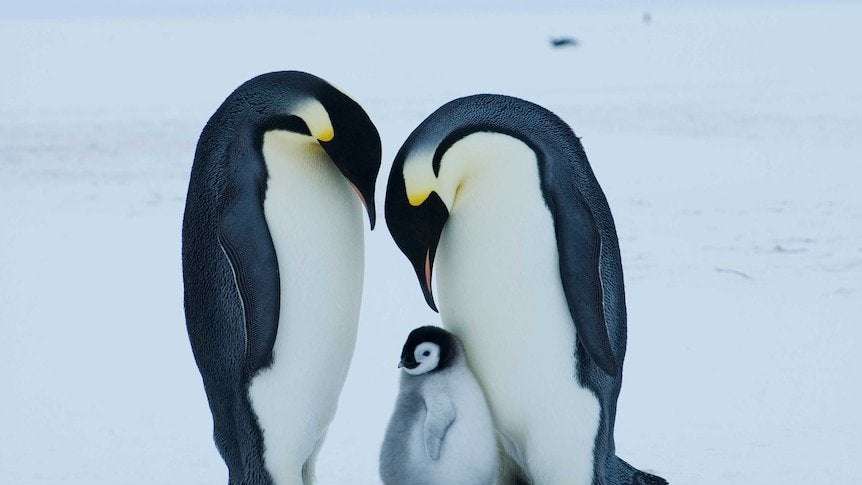The emperor penguin is at severe risk of extinction in the next 30 to 40 years as a result of climate change, according to research by the Argentine Antarctic Institute (IAA).
Key points: Penguin chicks succumb to freezing or drowning when exposed to the ocean before they grow their waterproof plumage
Penguin chicks succumb to freezing or drowning when exposed to the ocean before they grow their waterproof plumage If nothing changes, many colonies will disappear in the next 30 to 40 years
If nothing changes, many colonies will disappear in the next 30 to 40 years Tourist and fishing activity also harms the penguins, disrupting the food cycle
The emperor, the world's largest penguin and one of only two penguin species endemic to Antarctica, gives birth during the Antarctic winter and requires solid sea ice from April through to December to nest fledgling chicks.
If the sea freezes later or melts prematurely, the emperor family cannot complete its reproductive cycle.
"If the water reaches the newborn penguins, which are not ready to swim and do not have waterproof plumage, they die of the cold and drown," said biologist Marcela Libertelli, who has studied 15,000 penguins across two colonies in Antarctica at the IAA.
This has happened at the Halley Bay colony in the Weddell Sea, the second-largest Emperor penguin colony, where for three years all the chicks died.
Every August, in the middle of the southern hemisphere winter, Dr Libertelli and other scientists at Argentina's Marambio Base in Antarctica travel 65 km each day by motorbike in temperatures as low as -40 degrees Celsius to reach the nearest Emperor penguin colony.
Once there, they count, weigh, and measure the chicks, gather geographical coordinates, and take blood samples. They also conduct aerial analysis.
Every August, researchers from Argentina's Antarctic Institute travel to Halley Bay to study the colony's chicks. ( British Antarctic Survey: Peter Fretwell )
The scientists' findings point to a grim future for the species if climate change is not mitigated.
"[Climate] projections suggest that the colonies that are located between latitudes 60 and 70 degrees [south] will disappear in the next few decades; that is, in the next 30, 40 years," Dr Libertelli said.
The emperor's unique features include the longest reproductive cycle among penguins.
After a chick is born, one parent continues carrying it between its legs for warmth until it develops its final plumage.
"The disappearance of any species is a tragedy for the planet. Whether small or large, plant or animal — it doesn't matter. It's a loss for biodiversity," Dr Libertelli said.
The emperor penguin's disappearance could have a dramatic impact throughout Antarctica, an extreme environment where food chains have fewer members and fewer links, Dr Libertelli said.
In early April, the World Meteorological Organization warned of "increasingly extreme temperatures coupled with unusual rainfall and ice melting in Antarctica" — a "worrying trend", said Dr Libertelli, with Antarctic ice sheets depleting since at least 1999.
The rise of tourism and fishing in Antarctica have also put the emperor's future at risk by affecting krill, one of the main sources of food for penguins and other species.
"Tourist boats often have various negative effects on Antarctica, as do the fisheries," Dr Libertelli said.
"It is important that there is greater control and that we think about the future."

achyshaky on May 8th, 2022 at 14:10 UTC »
I would say 2022 is a nightmare, but it isn’t worth saying anymore. Every year has been a nightmare for almost a decade now. So will 2023, probably.
VKH700 on May 8th, 2022 at 12:31 UTC »
Al Gore’s chart was right. We are doomed.
Safety_Drance on May 8th, 2022 at 09:59 UTC »
If you motherfuckers kill the cutest animal off...
-god
Post Script: They have little fluffy babies that are even cuter than the parents.
Get back to me.
-god